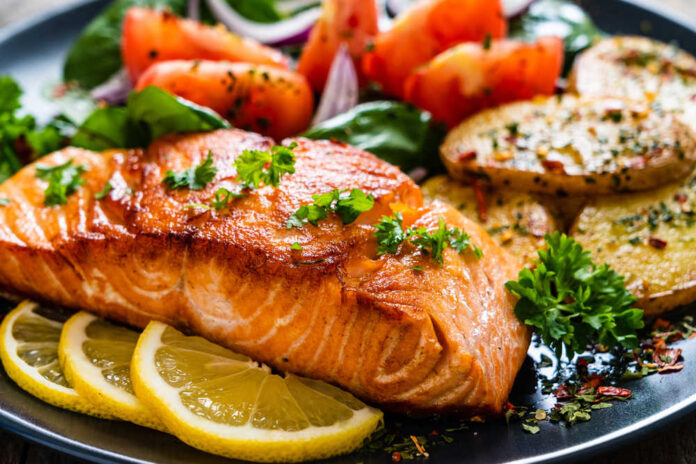
Many people think that dietary fat is an enemy of good health.
However, fats are essential to a healthy diet—as long as you choose the right kinds.
Fatty acid molecules are needed for various bodily functions, including cell development, hormone production, and nutrient absorption. Plus, fats provide a concentrated energy source and contribute to healthy skin and hair.
But there are many different fat varieties, and some dietary fats are better for you than others. Here are four healthy fats that you can incorporate into your diet:
Fish
Fatty fish like salmon, mackerel, trout, sardines, and tuna are a great source of healthy omega-3 fatty acids.
The American Heart Association recommends that people eat two servings of (non-fried) fish every week. This is because omega-3s and other compounds in fish have been shown to reduce the risk of:
- chronic heart disease
- stroke
- heart failure
- sudden cardiac death
- congestive heart failure
Omega-3 fatty acids have this cardioprotective effect thanks to their beneficial influence on many risk factors associated with these conditions, including:
- arrhythmias
- atherosclerosis
- inflammation
- thrombosis
- endothelial function
- high blood pressure
- cholesterol levels
Nuts and Seeds
Nuts and seeds are another good source of healthy fats, particularly unsaturated fats.
Unsaturated fats can help to:
- lower LDL (“bad”) cholesterol levels
- reduce inflammation
- improve blood sugar control
Nuts and seeds also come paired with proteins, vitamins, minerals, and antioxidants, providing additional health benefits.
To get the most out of nuts and seeds, choose a variety and eat them in moderation. Some good options include:
- almonds
- walnuts
- pistachios
- cashews
- peanuts
- flax seeds
- chia seeds
- hemp seeds
- pumpkin seeds
Beans, Peas, and Legumes
Although most of us don’t usually think of beans this way, beans, peas, and legumes are a subtype of seed, so they contain many of the same health-promoting fatty acids and nutrients.
Multiple clinical studies have demonstrated that people who include more beans in their diets tend to maintain a healthier weight and have a reduced risk of obesity and chronic diseases like heart disease, stroke, type 2 diabetes, immune diseases, and some cancers.
Vegetable Oils
Fats are very useful in the kitchen when you are cooking or baking. They help to:
- bind ingredients together
- conduct heat
- add flavor
- improve the texture of food
Unfortunately, common cooking fats such as butter and lard are high in saturated fats, which can negatively affect health if consumed in excess.
A better option is to use vegetable oils instead, which are high in healthier unsaturated fats. Common favorites include:
- olive oil
- grapeseed oil
- peanut oil
- avocado oil
- sunflower oil
- soybean oil
Remember that these healthier oils are very calorie-dense and should be used sparingly.
Fats To Avoid
The two types of dietary fat that are generally considered most harmful to your health are trans fats and saturated fats.
Trans fats are created when manufacturers chemically alter vegetable oils, adding hydrogen atoms to the molecules. This process, known as “hydrogenation,” makes the oils more solid, shelf-stable, and less likely to go rancid. Unfortunately, it also makes them much more harmful to your health.
Saturated fats are mostly found in animal products like red meat and dairy.
Trans fats and saturated fats appear to:
- increase LDL (“bad”) cholesterol levels
- promote inflammation
- reduce insulin sensitivity (a major risk factor for type 2 diabetes)
- contribute to atherosclerosis (hardening of the arteries)
- significantly increase your risk of heart disease and stroke
For these reasons, health organizations recommend you minimize your intake of both trans fats and saturated fats and maximize your intake of healthy unsaturated fats found in fish and plant-based foods.






















